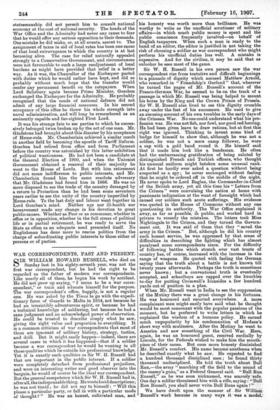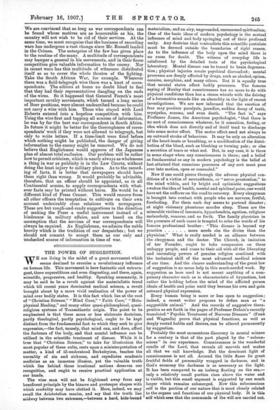WAR CORRESPONDENTS, PAST AND PRESENT.
SIE WILLIAM HOWARD RUSSELL, who died on Sunday last in his eighty-seventh year, was not the first war correspondent, but he had the right to be regarded as the father of modern war correspondents. Like nearly all of them, he began his work by accident. He did not grow up saying, "I mean to be a war corre- spondent," or train and educate himself for the purpose. The war correspondent's office, happily, is not a regular one. He was asked by the Times to go with the expedi- tionary force of Guards to Malta in 1854, not because he had an irresistibly adventurous spirit, or because he had a technical knowledge of soldiering, but because he had a sane judgment and an acknowledged power of observation. He could be trusted to describe simply what he saw, giving the right value and proportion to everything. It is a common criticism of war correspondents that most of them are ignorant of military history, strategy, tactics, and drill. But it might easily happen—indeed, there are several cases in which it has happened—that if a soldier became a war correspondent be would be wanting in all those qualities which lie outside his professional knowledge. Yet it is exactly such qualities as Sir W. H. Russell had that are important in the public interest. If a soldier were completely detached from professional prejudices, and were an interesting writer and good observer into the bargain, he would of course be the ideal war correspondent. But the general competence which Sir W. H. Russell had is, after all, the indispensable thin g. He wrote lucid descriptions ; he was not timid ; he did not say to himself : "Will this please a particular party, or fall in with a particular mode of thought ? " He was an honest, cultivated man, and
his honesty was worth more than brilliance. He was worthy to write as the unofficial scrutineer of military affairs—in which much public money is spent and the public conscience frequently involved—on behalf of English taxpayers. When such a man is ready to the hand of an editor, the editor is justified in not taking the risk of choosing a soldier as war correspondent who might perform his unofficial duties less well. A mistake is expensive. And for the civilian, it may be said that as onlooker he sees most of the game.
Sir W. H. Russell in his own person saw the war correspondent rise from tentative and difficult beginnings to a pinnacle of dignity which amused Matthew Arnold, who remarked in 'Friendship's Garland" that, wherever he turned the pages of Mr. Russell's account of the Franco-German War, he seemed to be on the track of a passage in which Mr. Russell was being helped to mount his horse by the King and the Crown Prince of Prussia. Sir W. H. Russell also lived to see this dignity crumble away under the feet of his successors. He used to give an amusing account of his own troubles in the early days of the Crimean War. No one could understand what his pro- fession was. He was not fish, nor fowl, nor good red herring. He had been given leave to draw rations, but at first this right was ignored. Thinking to invent some kind of badge for himself to show that, although he was not a soldier, he was not a mere camp follower, he wore a cap with a gold band round it. He himself said that it made him look like a bandsman. He often had the embarrassing gratification of being saluted by distinguished French and Turkish officers, who thought his unusual uniform might betoken some unusual rank. At first he hardly ever asked a question without being suspected as a spy ; he never encamped without feeling that he might be ordered off in the middle of the night. He never spoke to Lord Raglan, the Commander-in-Chief of the British army, yet all this time his "Letters from the Crimea" were convulsing the nation at home with passionate indignation at the want of foresight which had caused our soldiers such acute sufferings. His evidence was quoted in the House of Commons without any one questioning its authority. The War Office explained it away, as far as possible, in public, and worked hard in private to remedy the mistakes. The letters took Miss Nightingale to the Crimea, and they turned the Govern- ment out. It was said of them that they "saved the army in the Crimea." But, although he did his country such honest service, he was oppressed by that sense of difficulties in describing the fighting which has almost paralysed some correspondents since. For the difficulty of following battles which stretch over vast tracts of country has, of course, increased with the increase in the range of weapons. He quoted with feeling the German saying that the truth about a battle is not known till twenty years afterwards. Perhaps the truth is sometimes never known ; but a conventional truth is eventually accepted, and schoolboys are rapped over the knuckles to-day for putting Cromwell'a Ironsides a few hundred yards out of position in a plan. When Mr. Russell went to India to see the suppression of the Mutiny there was a great change in his fortunes. He was honoured and escorted everywhere. A more complaisant man might easily have said what he thought would be most consonant with the popular passions of the moment, but he preferred to write letters in which he explained the wisdom of a humane policy. He earned much unpopularity by his condemnation of Hodson's short way with mutineers. After the Mutiny he went to America and saw something of the Civil War. Here, again, he was an honoured guest, received cordially by Lincoln, for the Federals wished to make him the mouth- piece of their 'cause. But once more honesty diminished Mr. Russell's comfort. His name became anathema when he described exactly what be saw. He expected to find- a hundred thousand disciplined men ; he found thirty thousand undisciplined. He told the truth about Bull Run,—the army "marching off the field to the sound of the enemy's guns," as a Federal General said. "Bull Run Russell," as he was soon nicknamed, was scarcely •safe. One day a soldier threatened him with a rifle, saying : Run Russell, you shall never write Bull Runs again !"• We have dwelt upon the manner of . Sir William., Russell's work because in many ways it' was a model: - We are convinced that so long as war correspondents can be found whose motives are as honourable as his, the country will not wish to be rid of their services. At the same time, we must recognise that the business of recording wars has undergone a vast change since Mr. Russell landed in the Crimea. The enterprise of the few has given place to the routine of the many. A multitude of correspondents may hamper a, general in his movements, and in their fierce competition give valuable information to the enemy. Nor in recent wars has this multitude of witnesses distributed itself so as to cover the whole theatre of the fighting. Take the South African War, for example. Wherever there was a field-telegraph wire there was a knot of corre- spondents. The editors at home no doubt liked to feel that they had their representatives dangling on the ends of the wires. So it happened that General French's most important cavalry movements, which turned a long series of Boer positions, were almost undescribed because he could not carry a wire with him. Those who stayed with Lord Roberts entered into a hopeless competition with him. Using the wire first and tapping all sources of information, he was by far the best war correspondent in South Africa. In future it might be better for the thoroughness of corre- spondents' work if they were not allowed to telegraph, but only to write letters. If a time-limit were fixed before which nothing might be published, the danger of giving information to the enemy might be removed. We do not believe that Englishmen would approve of the Japanese plan of almost total exclusion. Our problem will be rather how to permit criticism, which is nearly always as wholesome a thing in war as publicity is in the Law Courts, without doing the least injury to military plans. As to the record- ing of facts, it is better that newspapers should have them right than wrong. It would probably be advisable, therefore, that an officer should be appointed, as in all Continental armies, to supply correspondents with what- ever facts may be printed without harm. He would be a different kind of Press Censor. This would remove from all other officers the temptation to cultivate on their own account undesirably close relations with newspapers. These are but rough-and-ready suggestions in the direction of making the Press a useful instrument instead of a hindrance in military affairs, and are based on the assumption that the services of war correspondents will always be required. As Englishmen, we admire the noble brevity which is the tradition of our despatches ; but we should not consent to accept them as our only and unchecked source of information in time of war.







































 Previous page
Previous page